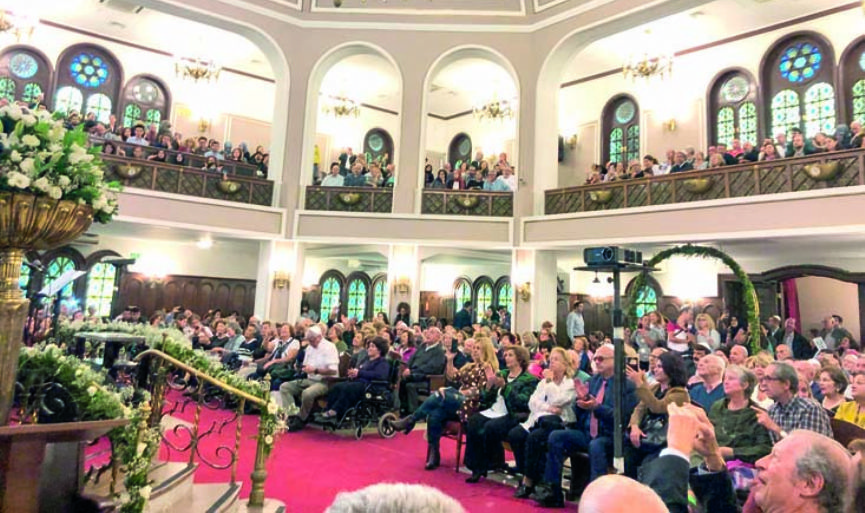A Journey to Jewish culture and traditions through tales and stories on European Day of Jewish Culture
European Day of Jewish Culture, an annual cultural event organized in 35 countries throughout Europe including Turkey, was held this year on October 14th at Neve Salom Synagogue and the Quincentennial Foundation Museum of Turkish Jews with a massive turnout. The events theme this year was storytelling. The culture and traditions of Jews living in Turkey were told through tales and stories.
by Şeli Gaon/Pınar Kılavuz
The culture and traditions of Turkish Jewish community, the fading Judeo-Espanyol (Ladino) language spoken by Sephardic Jews and the Sephardic cuisine were introduced to visitors through concerts, documentaries, chat sessions, exhibitions and workshops at European Day of Jewish Culture. The goal of the event was to reveal and share the cultural and historical heritage of the Jews, their traditional music, art and customs with the people of this country.
The whole event was open to public and its diverse content took the visitors on a journey to the lifestyle of Turkish Jews.
Throughout the day, there were three different exhibitions at three different venues. ‘Anne Frank A History’ exhibition, Izzet Keribar’s photo exhibition displaying Jewish life, and ‘Centropa’, an oral history project that depicts a certain period were swarmed by visitors. The Quincentennial Foundation Museum of Turkish Jews was also visited by a huge number of visitors.
At the event, Suzet Herman and Seli Gaon talked about the history and etymology of Judeo-Espanyol language. Judeo Espanyol is a language that was spoken by the Jews who migrated from Spain and is still being spoken, although less and less everyday by Turkish Jews.
At this year’s ‘Come, Let’s Meet’ event, the young hosts answered all of the questions coming from the guests and gave information about Jewish traditions and customs. The event aiming to cast away any prejudice, provided an open platform where people could engage in one-to one dialogue.
Acclaimed author and historian Naim Guleryuz introduced his new book ‘Jewish Settlements in Thrace and Anatolia Throughout History’ and in his speech he mentioned various historic events.
At the ‘Let’s Cook Together: Samples from Sephardic Cuisine’ workshop, Gilda Kohen gave information about historical and gastronomical aspects of Sephardic cuisine while she together with the visitors cooked delicious Sephardic food.
At ‘I’m Telling a Tale to Myself’ chat session, Moris Levi talked about Jewish stories, tales, aphorisms and his insights about Judaism.
At ‘The Sacred, Values and Traditions in Jewish Culture’ chat session, Sara Pardo talked about Jewish holidays, Kashrut, Shabbat and rules about social life.
At ‘Old Istanbul’ chat session Yusuf Altintas talked about his childhood years in Haskoy where he was born and raised as a kid and the relations between neighbors, back then.
At ‘Bridges of Tales’ workshop, author Tamara Pur, opened the magical gate to reality from dreams with tales and music. Estella Kucukbarokas, who describes herself as a storyteller, in her workshop ‘Jewish Tales from These Lands’ read passages from tales and stories passed on from one generation to the next, tales and stories that begin with the story of Sephardic Jews coming to Ottoman Empire.
Salom writer and author Bahar Feyzan talked about her first novel ‘Love Passenger’ at a chat session.
Soloists Cenk Rofe and Ediz Bahar accompanied by Cefi Sağlamlar and Izzet Bana’s Estreyikas d’Estambol Choir gave a concert at Neve Salom Synagogue. The voices of Rofe and Bahar mesmerized the audience at the concert ‘A Journey from Pop Music to Musicals and Classics ‘.
Sara Pardo gave a detailed presentation about Jewish wedding ceremonies in Izmir. She explained the traditions and the unique rituals before and after the wedding ceremony. The visitors showed great interest in the theatrical representation of the wedding ceremony. Especially the ritual where a tray full of kezada (marzipan) is passed over the heads of the bride and the groom after the wedding ceremony was found very interesting by the audience. This ritual represents a long life as sweet as the marzipan for the newlyweds for as long as they live.
Throughout the day there were three documentary screenings. Deniz Alphan’s ‘A Fading Language, a Fading Cuisine’ documentary depicted the danger of extinction Judeo Espanyol language and Sephardic cuisine face, today.
The second documentary was ‘Kula 930’, a documentary by Alberto Modiano about the play ‘Kula 930’ which was first staged 40 years ago in Judeo Espanyol which is still the only play still being staged in Judeo Espanyol, today. The documentary depicts life in Kuledibi and Sishane neighborhoods aka Kula where Jews mostly lived in 1930’s, through the eyes of the play’s cast. The third documentary was Eytan Ipeker’s ‘Lace Dealer’. The documentary is about Yasef Efendi, a lace dealer in Balat in late 1950’s who has strived to adapt to social changes in the country.
The all-day event with a record number of visitors this year – over two thousand – ended with Semes Karmiel’s dance performance.
We hope that this annual event which is being organized with the goals to bring people from all communities living in this country for over 500 years together, become an enabler of dialogue and enrich people’s life with new information, will continue to be organized for many years to come with more and more visitors each year.
Related Newsss ss













